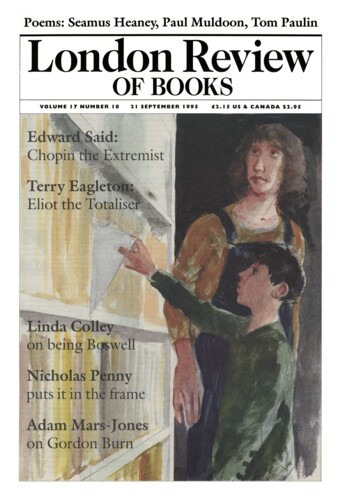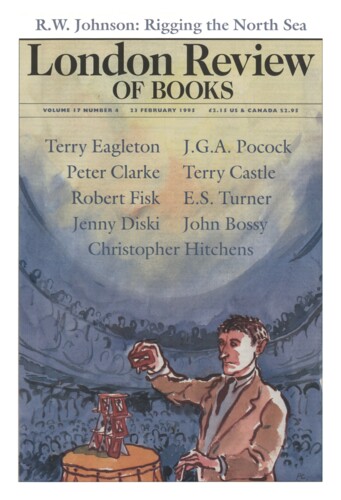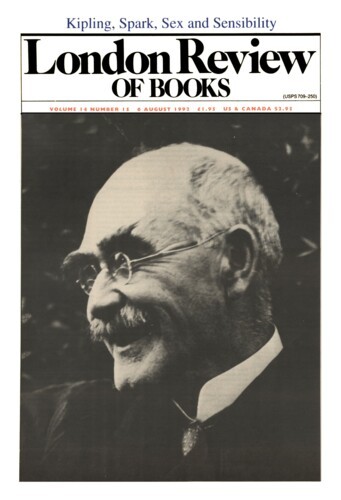Claude Rawson
Claude Rawson is a professor of English at the University of Warwick. His books include Henry Fielding and the Augustan Ideal under Stress and Gulliver and the Gentle Reader. He is editor of the Modern Language Review.
Authorial Displeasure
23 February 1995
Stewed, roasted, baked or boiled
Claude Rawson, 6 August 1992
The Intelligencer was a periodical mainly but not exclusively of Irish interest. It ran to 19 more or less weekly numbers between May and December 1728, with a longish interruption in the summer, and a single further number in May 1729. It was written by Jonathan Swift and his friend Thomas Sheridan, a clergyman, schoolteacher and man of letters, and grandfather of the playwright. It includes at least two of Swift’s important works, his critique of the Beggar’s Opera in No 3, and a reprint of the ‘Short View of the State of Ireland’ in No 15, perhaps the single most eloquent of his Irish writings, and close in time and subject-matter to A Modest Proposal, a more famous work (though not for its eloquence, or not in the same sense).
Groovy
9 April 1992
Agamemnon, Smith and Thomson
Claude Rawson, 9 April 1992
At the end of Book Two of the Iliad, in the famous catalogue of the Greek and Trojan forces, the Carians, allies of Troy, led by their chief Nastes, are referred to as barbarophonoi, literally ‘of barbarian (i.e. non-Greek) speech’. Since barbaros (an onomatopoeic term suggesting babble, which does not occur in Homer) meant ‘one who does not speak Greek’, Homer’s compound word – the only occurrence in the Iliad of any derivative of barbaros – is pleonastic, or perhaps overemphatic or fussy (according to G.S. Kirk’s Commentary, it is also ‘surprising’, because the land of the Carians was inhabited by Mycenaean Greeks toward the end of the Bronze Age’). Not speaking Greek might signify other forms of outlandishness, including primitive habits and wild or uncivilised behaviour, and the subsequent history of the term ‘barbarian’ in various languages has been ethnocentric in a sense which tended to link civilised status with possession of the approved dominant language (first Greek, then Latin, followed by the various world-languages of later imperial hegemonies). ‘Barbarian’ and ‘barbarous’ are now typically used to suggest the savage or uncivilised without any strong consciousness of a linguistic factor, but the history of modern encounters with ‘primitive’ peoples, from 16th-century Amerindians to the various subject races of more recent colonial perspectives, shows that the barbarian has continued to be conceived as speaking a non-speech or ‘jabber’. And those who, like Montaigne, adopted the traditional ‘anti-colonialist’ or relativist counter-argument that the barbarians were less barbaric than their conquerors were fond of suggesting, in a table-turning appeal to etymology, that Amerindian languages resembled, or might have been related to, Greek.’
Pieces about Claude Rawson in the LRB
A Spot of Firm Government: Claude Rawson
Terry Eagleton, 23 August 2001
It is remarkable how many literary studies of so-called barbarians have appeared over the past couple of decades. Representations of Gypsies, cannibals, Aboriginals, wolfboys, noble savages:...
Uppish
W.B. Carnochan, 23 February 1995
Item: in 1684, there appeared John Oldham’s posthumous Remains in Verse and Prose, with a prefatory elegy by John Dryden, ‘Farewell, too little and too lately known’....
Denis Donoghue writes about the Age of Rawson, and Rogers
Denis Donoghue, 6 February 1986
Now that the main ideas at large in the 18th century have been elaborately described, students of the period have been resorting to more oblique procedures. In 1968, in The Counterfeiters, Hugh...
Masters
Christopher Ricks, 3 May 1984
The life of Swift by Irvin Ehrenpreis is a great act of consonance. But one reviewer has deprecated the fact that Ehrenpreis does not write with Swift’s genius. So the first thing to say is...
Read anywhere with the London Review of Books app, available now from the App Store for Apple devices, Google Play for Android devices and Amazon for your Kindle Fire.
Sign up to our newsletter
For highlights from the latest issue, our archive and the blog, as well as news, events and exclusive promotions.




